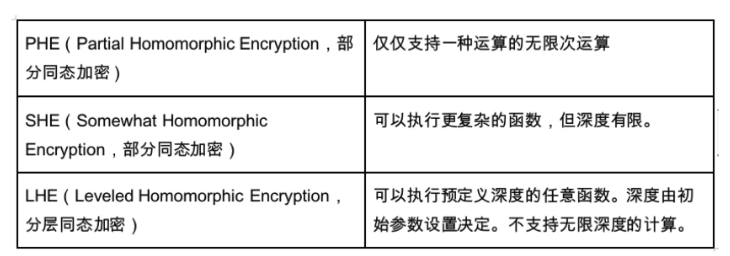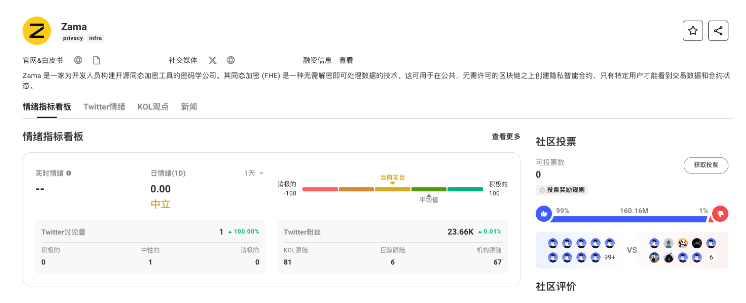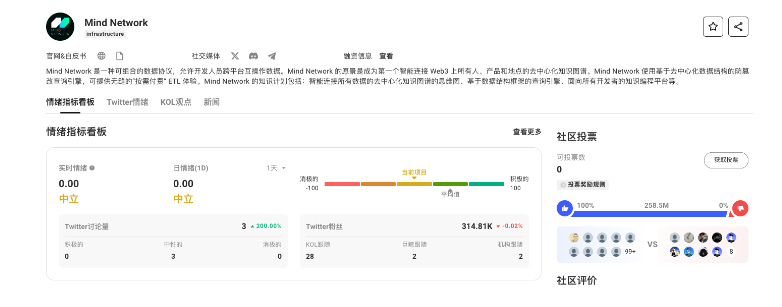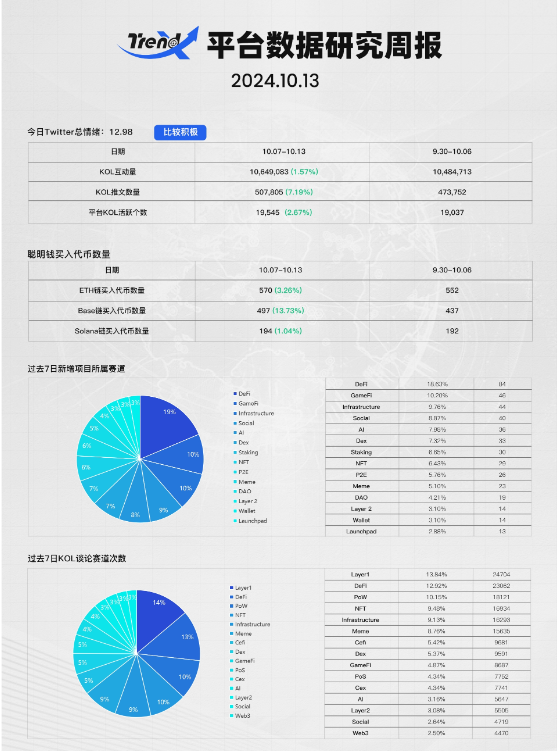As of October 13, the data statistics for BTC, ETH, and TON on the TrendX platform are as follows:
The discussion count for BTC last week was 12.52K, down 0.98% from the week before, with a price of $63,916 last Sunday, up 1.62% from the Sunday before that;
The discussion count for ETH last week was 3.63K, up 3.45% from the week before, with a price of $2,530 last Sunday, down 4% from the Sunday before that;
The discussion count for TON last week was 782, down 12.63% from the week before, with a price of $5.26 last Sunday, down 0.25% from the Sunday before that;
Fully Homomorphic Encryption (FHE) is a highly promising technology in current cryptography, with its core feature allowing computations to be performed directly on encrypted data without the need for decryption, providing strong support for privacy protection and data processing. FHE can be widely applied in fields such as finance, healthcare, cloud computing, machine learning, voting systems, the Internet of Things, and blockchain privacy protection. However, despite the broad application prospects of FHE, it still faces challenges on the path to commercialization.
Potential and Application Scenarios of FHE
The greatest advantage of homomorphic encryption lies in privacy protection. Imagine that Company A needs to utilize Company B's computing power to analyze its data but does not want Company B to access the specific content of that data. FHE can play a role in this scenario: Company A can encrypt the data and send it to Company B for computation, with the computation results remaining encrypted, allowing Company A to decrypt and obtain the analysis results. In this way, data privacy is effectively protected, while Company B can complete the required computational work.
This privacy protection mechanism is particularly important in data-sensitive industries such as finance and healthcare. Additionally, with the development of cloud computing and artificial intelligence, data security has become an increasing focus. FHE can provide multi-party computation protection in these scenarios, enabling collaboration without exposing private information. Especially in blockchain technology, FHE enhances the transparency and security of data processing through on-chain privacy protection and privacy transaction auditing functions.
Comparison of FHE with Other Encryption Methods
In the Web3 field, FHE, Zero-Knowledge Proofs (ZK), Multi-Party Computation (MPC), and Trusted Execution Environments (TEE) are all major privacy protection methods. Unlike ZK, FHE can perform various operations on encrypted data without first decrypting it. MPC allows parties to compute while keeping data encrypted, without sharing private information with each other. TEE provides a secure environment for computation but has relatively limited flexibility in data processing.
These encryption technologies each have their advantages, but FHE is particularly outstanding in supporting complex computational tasks. Nevertheless, FHE still faces issues of high computational overhead and poor scalability in practical applications, making it often inadequate for real-time applications.
Limitations and Challenges of FHE Despite the strong theoretical foundation of FHE, it encounters practical challenges in commercial applications.

High Computational Overhead: FHE requires a significant amount of computational resources, with its computational overhead significantly increased compared to unencrypted computations. For high-degree polynomial operations, the processing time grows polynomially, making it difficult for FHE to meet real-time computing demands. To reduce costs, FHE relies on dedicated hardware acceleration, which also increases deployment complexity.
Limited Operational Capability: Although FHE can perform addition and multiplication on encrypted data, its support for complex nonlinear operations is limited, which is a bottleneck for artificial intelligence applications involving deep neural networks. Current FHE schemes are still mainly suitable for linear and simple polynomial computations, with significant limitations on the application of nonlinear models.
Complexity of Multi-User Support: FHE performs well in single-user scenarios, but the system complexity rises sharply when dealing with multi-user datasets. In 2013, the multi-key FHE framework proposed by Lopez-Alt et al. allowed operations on encrypted datasets with different keys, but significantly increased the complexity of key management and system architecture.
Integration of FHE with Artificial Intelligence
In the current data-driven era, artificial intelligence (AI) is widely applied across various fields, but due to concerns about data privacy, users are often reluctant to share sensitive data, such as medical and financial information. FHE provides a privacy protection solution for the AI field. In cloud computing scenarios, data is often encrypted during transmission and storage, but is frequently in plaintext during processing. With FHE, users' data can be processed while remaining encrypted, ensuring data privacy.
This advantage is particularly important under regulations such as GDPR, which require users to have the right to know how their data is processed and ensure that data is protected during transmission. FHE's end-to-end encryption provides assurance for compliance and data security.
Current Applications and Projects of FHE in Blockchain
The application of FHE in blockchain mainly focuses on protecting data privacy, including on-chain privacy, AI training data privacy, on-chain voting privacy, and on-chain privacy transaction auditing. Currently, many projects utilize FHE technology to promote the realization of privacy protection. For example, the FHE solution developed by Zama is widely used in projects such as Fhenix, Privasea, IncoNetwork, and MindNetwork.
Zama: Based on TFHE technology, focusing on Boolean operations and low-word-length integer operations, and building an FHE development stack for blockchain and AI applications.

More information:
TrendX - Web3 Investment Guide

Octra: Developed a new smart contract language and HyperghraphFHE library suitable for blockchain networks.
Privasea: Utilizes FHE to achieve privacy protection in AI computing networks, supporting various AI models.

More information:
TrendX - Web3 Investment Guide
MindNetwork: Combines FHE with artificial intelligence to provide a decentralized and privacy-protecting AI environment.

More information:
TrendX - Web3 Investment Guide
Fhenix: As a Layer 2 solution for Ethereum, it supports FHE Rollups and FHE Coprocessors, is EVM compatible, and supports smart contracts written in Solidity.

More information:
Research Data
Conclusion
FHE, as an advanced technology that can perform computations on encrypted data, has significant advantages in protecting data privacy. Although the current commercialization of FHE still faces challenges such as high computational overhead and poor scalability, these issues are expected to be gradually resolved through hardware acceleration and algorithm optimization. Furthermore, with the development of blockchain technology, FHE will play an increasingly important role in privacy protection and secure computing. In the future, FHE may become a core technology supporting privacy-protecting computation, bringing new revolutionary breakthroughs in data security.

Follow Us on TrendX
TrendX - No.1 Web3 investment opportunity platform, relying on industry-leading AI analysis technology and on-chain and off-chain trend tracking technology, analyzes real-time investment opportunities from billions of data dynamics, providing investment advice through intuitive interaction methods, adhering to the concept of 'change is opportunity', and striving to become the preferred Web3 investment platform for users.
Investment involves risks, and projects are for reference only; please bear the risks yourself.
免责声明:本文章仅代表作者个人观点,不代表本平台的立场和观点。本文章仅供信息分享,不构成对任何人的任何投资建议。用户与作者之间的任何争议,与本平台无关。如网页中刊载的文章或图片涉及侵权,请提供相关的权利证明和身份证明发送邮件到support@aicoin.com,本平台相关工作人员将会进行核查。




